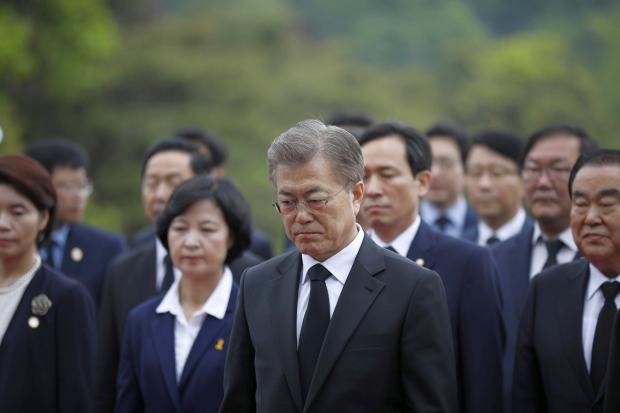South Korea’s new president says willing to visit rival North Korea

New South Korean President Moon Jae-in (center) arrives at the National Cemetery in Seoul, South Korea Wednesday, May 10, 2017. Moon visited the national cemetery where he honored the country’s former presidents, independence fighters and war heroes as he began his presidential duties. (Pool photo by KIM HONG-JI via AP)
SEOUL, South Korea — New South Korean President Moon Jae-in said Wednesday he was open to visiting rival North Korea under the right conditions to talk about Pyongyang’s aggressive pursuit of nuclear-tipped missiles.
Moon½s softer stance on North Korea could create friction with Washington, which has swung from threats of military action to hints of dialogue as it seeks to formulate a policy under President Donald Trump.
Moon, speaking during his formal oath of office, also said he½ll “sincerely negotiate” with the United States, Seoul½s top ally, and China, South Korea’s top trading partner, over the contentious deployment of an advanced US missile-defense system in southern South Korea. The system has angered Beijing, which says its powerful radars allow Washington to spy on its own military operations.
In a speech at the National Assembly hours after being declared the winner of Tuesday½s election, Moon pledged to work for peace on the Korean Peninsula amid growing worry over the North½s expanding nuclear weapons and missiles program.
“I will quickly move to solve the crisis in national security. I am willing to go anywhere for the peace of the Korean Peninsula — if needed, I will fly immediately to Washington. I will go to Beijing and I will go to Tokyo. If the conditions shape up, I will go to Pyongyang,” Moon said.
Moon, whose victory capped one of the most turbulent political stretches in the nation½s recent history and set up its first liberal rule in a decade, assumed presidential duties early in the morning after the National Election Commission finished counting and declared him winner of the special election necessitated by the ousting of conservative Park Geun-hye.
He is also expected to nominate a prime minister, the country½s No. 2 job that requires approval from lawmakers, and name his presidential chief of staff during the day.
Taking up duties as commander in chief, Moon received a call from Army Gen. Lee Sun-jin, chairman of South Korea½s Joint Chiefs of Staff, who briefed him on the military½s preparedness against North Korea.
He then left his him, receiving an emotional send-off from hundreds of residents, before visiting a national cemetery in Seoul. After bowing to honor the former presidents, independence fighters and war heroes at the cemetery, Moon wrote “A country worth being proud of; a strong and reliable president!” in a visitor book.
He also visited the offices of opposition parties, seeking support in governing the country split along ideological lines and regional loyalties. His Democratic Party has only 120 seats in the 300-seat National Assembly, so he may need broader support while pushing his key policies.
The leaders of China and Japan sent him congratulatory messages. South Korea½s relations with Japan are strained by the Japanese military½s sexual exploitation of South Korean women during World War II, and relations with China have been strained by the THAAD missile-defense system recently deployed in South Korea. Moon made a campaign vow to reconsider the THAAD deployment.
The son of refugees who fled North Korea during the Korean War, Moon will lead a nation shaken by the scandal that felled Park, whose criminal trial is scheduled to start later this month.
Taking office without the usual two-month transition, Moon initially will have to depend on Park½s Cabinet ministers and aides, but he was expected to move quickly to replace them. He will serve the typical single five-year term.
Moon was chief of staff for the last liberal president, the late Roh Moo-hyun, who sought closer ties with North Korea by setting up large-scale aid shipments and working on now-stalled joint economic projects.
Winning 41 percent of the votes, he comfortably edged conservative Hong Joon-pyo and centrist Ahn Cheol-soo, who had 24 percent and 21 percent, respectively.
The conservative Hong had pitched himself as a “strongman,” described the election as a war between ideologies and questioned Moon½s patriotism.
Park½s trial on bribery, extortion and other corruption charges could send her to jail for life if she is convicted. Dozens of high-profile figures, including Park½s longtime confidante, Choi Soon-sil, and Samsung½s de facto leader, Lee Jae-yong, have been indicted along with Park.
Moon frequently appeared at anti-Park rallies and the corruption scandal boosted his push to re-establish liberal rule. He called for reforms to reduce social inequalities, excessive presidential power and corrupt ties between politicians and business leaders. Many of those legacies dated to the dictatorship of Park½s father, Park Chung-hee, whose 18-year rule was marked by both rapid economic rise and severe civil rights abuse.
Many analysts say Moon likely won½t pursue drastic rapprochement policies because North Korea½s nuclear program has progressed significantly since he was in the Roh government a decade ago.
A big challenge will be US President Donald Trump, who has proven himself unconventional in his approach to North Korea, swinging between intense pressure and threats and offers to talk.
“South Koreans are more concerned that Trump, rather than North Korean leader Kim Jong Un, will make a rash military move, because of his outrageous tweets, threats of force and unpredictability,” Duyeon Kim, a visiting fellow at the Korean Peninsula Future Forum in Seoul, wrote recently in Foreign Affairs magazine.
“It is crucial that Trump and the next South Korean president strike up instant, positive chemistry in their first meeting to help work through any bilateral differences and together deal with the North Korean challenge,” she said.
* * *
Associated Press writer Foster Klug contributed to this report.














